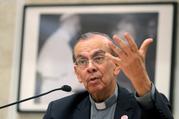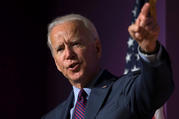Loading...
Click here if you don’t see subscription options
Click here if you don’t see subscription options

FaithNews
Since the establishment of the first Catholic newspapers in the United States, the pope said, local communities have relied on the ever-expanding forms of media "to share, to communicate, to inform and to unite."

Arts & CultureTelevision
As a Catholic active in the growing pro-life feminist movement, I found myself fascinated and motivated by “Mrs. America.”

Politics & SocietyEditorials
If the pandemic and the swell of protests have shown that Americans are still capable of heeding the call of their better angels, it has also exposed the flaws and deficiencies of our political leadership.

FaithNews
After calling for transparency and dialogue in the country, Cardinal Gregorio Rosa Chavez, auxiliary bishop of San Salvador, found himself under attack, including being called a "Judas" and other names via social media.

Politics & SocietyNews
On June 16, the country of more than 6.5 million reported a total of more than 4,000 confirmed cases and hit a daily high of 125 new reported cases, though some believe the figures are underreported.

Politics & SocietyNews
A "thicker conception" of the common good is needed and is precisely what Catholic social teaching can contribute to the public conversation.

Arts & CultureTelevision
“Mrs. America” is the best political drama on television right now, and perhaps the greatest feminocentric period piece to date.

Politics & SocietyOf Many Things
During a time of political polarization, writes Matt Malone S.J., it is more often the serious business of governing that is a distraction—from the partisan combat that has become our all-consuming pastime.

Politics & SocietyFeatures
We can no longer tolerate the serious problems that result from a broken and fragmented health care financing system.

Politics & SocietyEditorials
In the absence of irrefutable evidence, the public response has fallen, as with so much else in this era of polarization, along partisan lines.
